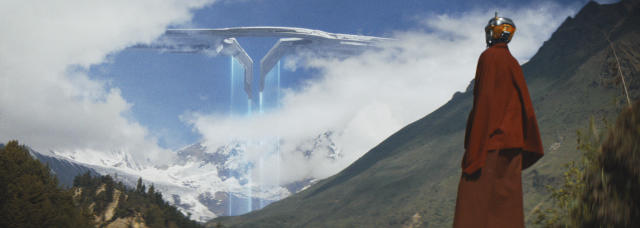Will Gareth Edward’s newest sci-fi epic stand the test of time?

Science fiction is one of my favorite genres in film. The endless possibilities of visionary storytelling and creative visuals have brought forth some of the best sci-fi films ever. Films such as Ridley Scott’s “Blade Runner” and James Cameron’s “Avatar” are some of the pinnacle examples of how expansive the genre can be. So one has to wonder if Gareth Edward’s latest attempt at an original sci-fi film will stand the test of time.
Edward’s “The Creator” begins with a montage of vintage-looking advertisements for AI technology, showcasing the technological marvels of having AI robots at humanity’s beck and call. It then starts to become a nightmare when the robots turn on humanity, resulting in an all-out war between the two. The robot AI are exiled from the United States and take refuge in New Asia where they are accepted. From there we are taken 50 years into the future and meet Joshua (John David Washington), a retired soldier who is sent on a mission to retrieve the AI weapon that could end the war.
At this point, the world has only partly been fleshed out. The political and social standings in this world have been explained, but it’s clear that there is more to be fleshed out about these characters. This is when we meet the AI weapon, which is revealed to be a child, who Joshua takes to help him find his wife who he previously believed to be dead. As the film progresses through its over two-hour runtime, we start to realize that we will not dig deeper into the underlying themes and character dimensions. Despite the fact that the film seems to want to present a racial allegory for its AI community, it never commits to that. The audience is expected to sympathize with the AI characters, which lean more on the fact that they resemble humans rather than taking the time to have us sympathize with them through further characterization. There are instances when you feel bad for how the Americans treat the human occupants of New Asia, but I never felt myself caring much for the AI characters because I knew they were just machines. The film barely gives us any real reason to care if these machines “die” or not. They do tell us that some of these robots care for human children like their own, but we don’t see many examples of this onscreen, making it hard to truly care about these robot’s fate.
When it comes to the AI weapon in the form of a child (Madeleine Yuna Voyles), it’s hard to apply the criticisms of the other robot characters to her. Mostly due to Voyles’ performance, it’s hard not to like the child, whom Joshua names Alphie, who garners our sympathy because she is just a kid caught in the middle of a war. We spend the entire film with her and Joshua, watching their bond grow. Although Joshua doesn’t possess any other character trait than “I need to save my wife” syndrome, it was nice to see his relationship with Alphie grow, for it was the only real character growth in the film.
The writing is what truly stops this film from being great. Every new revelation or twist we are given has little to no impact. There were at least three times when important information was dropped and they all happened in quick succession of each other, not giving any time for the audience to digest what we had just learned. But even with the writing holding it back, the world itself was creative enough to warrant more depth. The huge American space station that can destroy whole cities was a neat set piece that was a fun addition. I think this world had the potential to expand into something worthwhile if only the characters’ shallowness didn’t reflect on the world-building. Although Edward’s didn’t make the most outstanding sci-fi film, I appreciate the attempt to put together an original sci-fi film not based on any previous material. His craft in creating amazing visuals that enhanced the world he created held the film together. However, the stunning cinematography is not enough to save it from being shallow.
Image Courtesy of YahooLife







